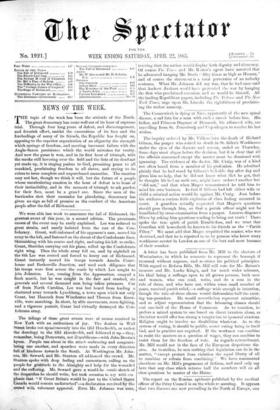A letter has been published from Mr. Mill to the
electors of Westminster, in which lie consents to represent the borough if returned without expense, and re-states his political principles. With regard to Reform Bills, Mr. Mill will vote for Mr. Baines'a measure and Mr. Locke King's, and for much wider schemes, his ideal being a suffrage open to all grown persons, both men and women, who can read, write, and do a sum in the rule of three, and who have not, within some small number of years, received parish relief,—a suffrage wide enough in intention, though the rule-of-three clause would disfranchise half the exist- ing ten-pounders. He would nevertheless represent minorities, and so adjust representation that the labouring classes should seat one-half of the House of Commons. As to taxation, he prefers a mixed system to one based on direct taxation alone, as the latter would offer too strong a temptai ion to immoral evasions. Religion ought to involve no disabilities whatever. As to the system of voting, it should be public, secret voting being in itself bad, and in practice not required. If the workmen can combine to resist the masters on a question of wages, they can combine to resist them for the freedom of vote. As regards retrenchment, Mr. Mill would not in the face of the European despotisms dis- arm. As to strikes, he sees nothing that legislation can do in the matter, "except protect from violation the equal liberty of all to combine or refrain from combining." We have commented elsewhere on Mr. Mill's programme of Reform, and need only say here that any class which returns half the members will on all class questions be master of the Hciuse.






























